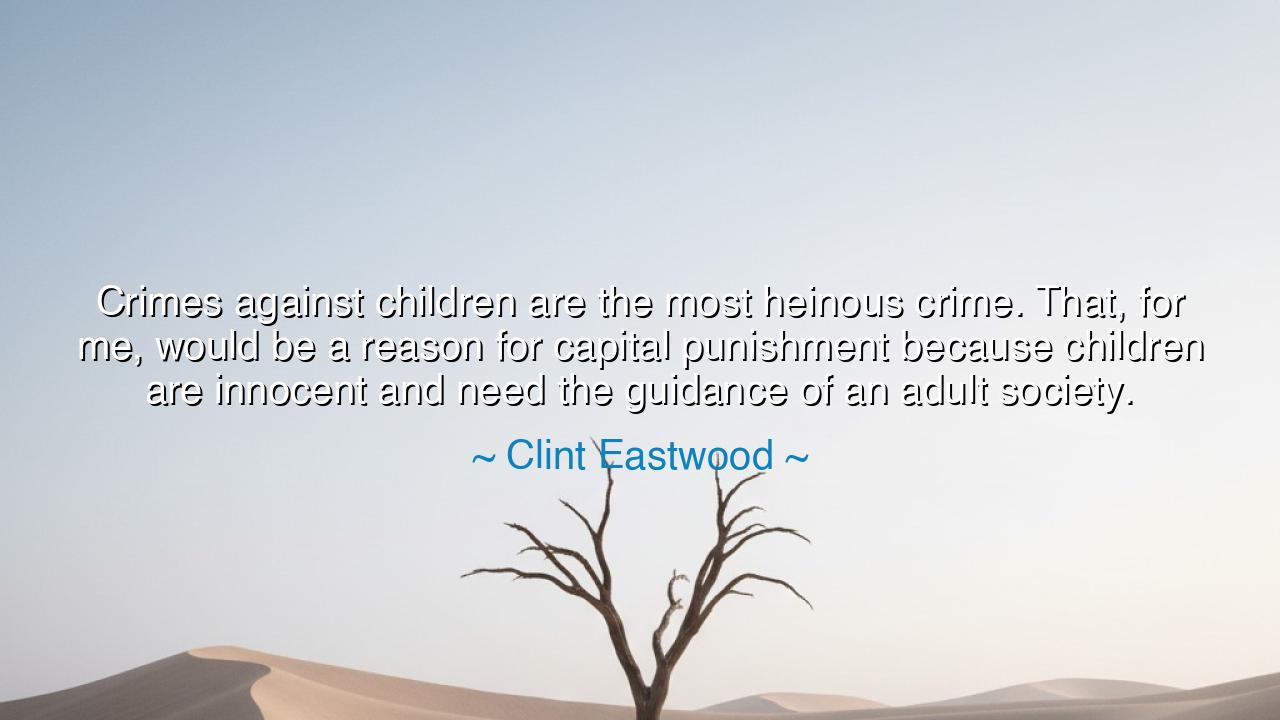
Crimes against children are the most heinous crime. That, for me
Crimes against children are the most heinous crime. That, for me, would be a reason for capital punishment because children are innocent and need the guidance of an adult society.






"Crimes against children are the most heinous crime." These are the solemn words of Clint Eastwood, a declaration that strikes deep into the soul, echoing through the chambers of history like a mighty bell tolling for the innocent. To harm a child is not just a violation of law or order—it is a crime against the very fabric of society, a betrayal of the future itself. Children are the embodiment of innocence, pure and untouched by the harshness of the world. They are the hope of tomorrow, the promise of all that is yet to come. When that hope is shattered, when the pure soul of a child is tainted, it is not just a wound upon that one life—it is a wound upon us all.
Consider, if you will, the ancient wisdom that speaks of justice and compassion. The Greeks taught that the state exists not only to protect the present, but to nurture the future. The gods themselves, in their wisdom, were seen as protectors of the young, for in the children, they saw the future of all civilization. In Homer’s Iliad, we learn that even in the darkest moments of war, the protection of the innocent was sacred. For to harm a child was not just an affront to the laws of men—it was an affront to the laws of the gods themselves. The crime against a child is not a mere act of violence; it is an act of destruction against the soul of a society.
Eastwood’s words are a sharp reminder that society has a duty to protect its most vulnerable. Children are not simply the future—they are the foundation of all that we hold dear. In them, we see the possibility of growth, of change, of hope. To allow harm to come to them is to undo the very fabric of civilization. Consider the story of Socrates, who was sentenced to death for corrupting the youth of Athens. While his actions were controversial, his fundamental belief was that the youth are the bearers of truth and wisdom. He knew that the future of the state rested on how the young were treated, guided, and shaped. The destruction of a child’s innocence is not a mere crime—it is an affront to the future wisdom and justice of the state.
Look now to the horrific atrocities that have plagued the world, where the innocent—especially children—have been sacrificed upon the altar of war, of hatred, and of power. During the Second World War, countless children were not only victims of the brutality of war, but were also subjected to the evils of concentration camps, where their bodies and spirits were destroyed by the forces of inhumanity. The Holocaust remains a reminder of how the destruction of innocent lives can scar the very soul of a nation. In the face of such suffering, the question arises: what is the price of justice? Is it enough simply to punish those who commit such crimes, or is the punishment itself a reflection of the society’s commitment to its sacred duty to protect its most vulnerable?
Eastwood's advocacy for capital punishment in the case of crimes against children stems not from a desire for vengeance, but from a profound recognition of the sanctity of childhood and the moral imperative to safeguard it. In many ways, the ultimate penalty for such a crime is a reflection of the unforgivable nature of the harm done. To destroy the life of a child is not simply to take a life—it is to rob the future of its potential, its possibility. The loss of a child is a loss of innocence, and that, in Eastwood’s eyes, cannot be easily undone or excused.
Yet, beyond the call for justice, there is a lesson here for us all: we must protect the innocent, especially the children among us. The future is not something that will simply unfold—it must be nurtured, cultivated, and guarded. The crimes against children, whether physical, emotional, or psychological, are a reflection of a society that has failed in its most fundamental duty. We must not look away when children suffer. We must speak out, act, and ensure that our society holds accountable those who would seek to destroy the future in the form of the innocent.
Thus, let us take from Eastwood’s words a call to action. Stand for the protection of children, for their well-being is the well-being of the entire world. Seek to create a society that uplifts, that cherishes, and that safeguards its most vulnerable. In our communities, let us create havens of safety, where children can thrive without fear, without harm. For it is in their light that we find the hope for tomorrow, and in their innocence that we find the soul of a just society. To fail them is to fail ourselves, and to protect them is to honor the deepest principles of our shared humanity.






AAdministratorAdministrator
Welcome, honored guests. Please leave a comment, we will respond soon